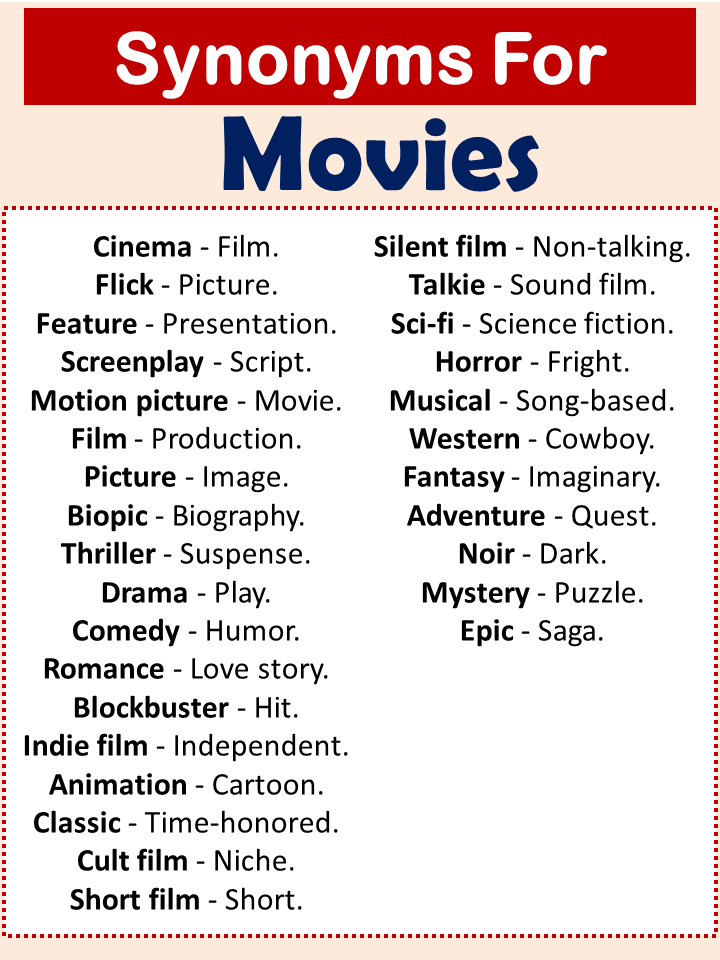Ever find yourself struggling to describe the latest blockbuster or indie gem you just watched? The English language offers a surprisingly rich tapestry of words beyond just "movie" to capture the essence of cinematic experiences. From the grandest epic to the humblest short, a diverse vocabulary empowers us to articulate our appreciation and dissect the art of filmmaking with nuance and precision.
The term "movie," a seemingly simple word, opens a gateway to a world of synonyms, each carrying its unique connotation and subtle shade of meaning. Whether you're a seasoned film critic or a casual viewer sharing recommendations with friends, expanding your lexicon allows for more evocative and engaging conversations about the art of storytelling on screen. Let's delve into the fascinating realm of words that paint vivid pictures of the moving image.
| Category | Details |
|---|---|
| General Synonyms | Film, flick, picture, feature, motion picture, moving picture, show, talkie, photoplay |
| Technical Formats | Videotape, MP4, MPEG |
| Related Terms | Cinema, films, pictures, showbiz, flicks, film industry, movie industry, show business, entertainment industry, show biz, filmmaking, Hollywood, screen, silver screen, moviemaking, big screen, filmdom |
| Specific Types | Documentary, cartoon, animated cartoon, short subject |
| Components | Movie clip, film clip, clip, cut, extract, footage, scene, segment, shot, snippet, television clip, film scene, film trailer |
| Series | Movie series |
| Showing Location | Cinema, movie theater, cineplex, fleapit, nickelodeon (movie house) |
The Oxford Languages dictionary defines "movie" simply, but the connotations associated with each synonym can significantly alter the perception of the cinematic work being described. "Film," for instance, often suggests a more artistic or serious endeavor, perhaps an independent production or a work with significant cultural merit. In contrast, "flick" often implies a lighter, more casual viewing experience, perhaps a comedy or an action-packed spectacle intended primarily for entertainment.
- Explore Somali Telegram Channels Groups Your 2024 Guide
- Hdhub4u Your Gateway To Bollywood Beyond Is It Legit
"Picture," a classic term for a movie, evokes a sense of timelessness and nostalgia, harking back to the golden age of Hollywood. Describing a modern film as a "picture" can lend it an air of old-world charm, whether intentional or ironic. "Feature" usually designates a full-length film, distinguishing it from shorts or documentaries. "Motion picture" and "moving picture" are more formal terms, emphasizing the technical aspect of the medium, particularly the illusion of movement created through a series of still images.
Beyond these common synonyms, the world of cinema boasts a rich vocabulary to describe its various facets. "Talkie" refers specifically to films with synchronized sound, a groundbreaking innovation that revolutionized the industry. "Photoplay" is another archaic term, reminiscent of the silent era, when films relied heavily on visual storytelling. With the advent of digital media, "videotape," "MP4," and "MPEG" have entered the lexicon, referring to the various formats in which movies are stored and distributed.
The environment in which a movie is viewed also shapes our vocabulary. We might go to the "cinema," the "movie theater," or even the "cineplex," depending on the scale and modernity of the establishment. The term "fleapit," a less flattering description, conjures images of rundown, older theaters. And for a truly nostalgic experience, one might visit a "nickelodeon," a type of early movie theater that charged a nickel for admission.
- Desire Movies More Explore Your Cinematic Desires Now
- Vegamovies 18 Filmmaking Behind The Scenes More Guide
Describing specific parts of a movie also demands a specialized vocabulary. A "movie clip," "film clip," or simply "clip" refers to a short excerpt from a longer film. "Footage" is another term for recorded film, often used in documentaries or news reports. "Scenes," "segments," and "shots" are all terms that describe specific units of a movie, each with its own distinct purpose and aesthetic.
Moreover, the industry surrounding the "movie" is described with many different words. "Showbiz" and "the entertainment industry" are commonly used phrases to talk about the broader entertainment sphere, of which "the movie industry" and "film industry" are subsets. "Hollywood" is often used as shorthand for the American film industry, while "filmdom" evokes a sense of the glamorous world of movies.
The act of creating a "movie" is described using "filmmaking" and "moviemaking." The "screen" and "silver screen" are metaphorical terms for the surface on which movies are projected, representing the gateway to another world. And for those who appreciate the grandeur of the cinema experience, the "big screen" remains the ultimate way to watch a "movie."
In the realm of genres, we encounter "documentary," "cartoon," and "animated cartoon." A "documentary" seeks to present factual information, while "cartoons" and "animated cartoons" rely on animation to create stories. A "short subject" is a film shorter than a feature film, often shown as part of a movie program.
A "film trailer" is a promotional video that showcases highlights from a movie, designed to entice viewers. And when a movie is released in multiple installments, it becomes a "movie series," inviting audiences to follow the continuing adventures of beloved characters.
Delving into the synonyms for "movie" reveals the versatility and expressiveness of the English language. Whether you're discussing the latest blockbuster, dissecting a classic, or simply sharing your love of cinema with friends, expanding your vocabulary allows you to communicate with greater precision and passion.
Instead of simply saying you enjoyed a "movie," you could describe it as a captivating "film," a thrilling "flick," or a thought-provoking "picture." You could discuss the breathtaking "footage," the memorable "scenes," or the cleverly edited "clips." You could praise the artistry of the "filmmaking" or the glamour of "Hollywood."
The next time you find yourself discussing a movie, challenge yourself to use a synonym that more accurately captures your experience. Explore the rich tapestry of words that the English language offers, and you'll discover a new level of appreciation for the art of cinema.
Consider the impact of adjectives when describing a "movie." Was it a suspenseful "thriller," a heartwarming "comedy," or a visually stunning "spectacle?" The right adjective can instantly convey the tone and quality of a film, sparking curiosity and encouraging others to seek it out.
Moreover, understanding the nuances of cinematic vocabulary can enhance your understanding of film criticism. By recognizing the subtle differences between "film," "movie," and "picture," you can better appreciate the critic's intent and the overall assessment of the work.
In conclusion, the seemingly simple word "movie" unlocks a world of linguistic possibilities. By embracing the diverse synonyms and related terms, we can enrich our conversations about cinema, deepen our appreciation for the art of filmmaking, and more effectively communicate our thoughts and experiences with others. So, the next time you talk about a movie, don't just say "movie" say "film," "flick," "picture," or any other word that best captures the magic of the moving image.
The use of these varied terms helps in creating reviews and recommendations that are not only informative but also engaging and persuasive. A well-chosen adjective can make all the difference, painting a vivid picture of the cinematic experience for potential viewers.
As audiences become more discerning, the need for a nuanced vocabulary to discuss films becomes even more crucial. Whether you're a casual moviegoer or a dedicated cinephile, expanding your linguistic repertoire will undoubtedly enhance your appreciation for the art of storytelling on screen.
From the independent "films" showcased at festivals to the big-budget "movies" that dominate the box office, there's a term to capture every type of cinematic experience. Explore these synonyms and unlock a new level of cinematic expression.
The availability of "movies" on various platforms, from streaming services to "movie theaters," has further diversified the way we consume and discuss them. This accessibility underscores the importance of having a robust vocabulary to navigate the ever-evolving landscape of cinematic arts.
By mastering these cinematic terms, you can elevate your conversations about "movies" and contribute to a richer and more informed appreciation of the art form.
The careful selection of words when discussing "movies" not only enhances communication but also demonstrates a deeper understanding and appreciation of the cinematic art form.
The language we use to describe "movies" shapes our perception of them. By choosing our words wisely, we can elevate the conversation and inspire others to engage with cinema on a more meaningful level.
Ultimately, the goal is to move beyond generic descriptions and embrace the rich and nuanced language that allows us to truly capture the essence of the "movie" experience.
Whether it's a gripping "drama," a hilarious "comedy," or a visually stunning "action movie," the right words can bring the cinematic experience to life for others.
The art of discussing "movies" lies in the ability to capture the intangible qualities that make them so compelling. A rich vocabulary is the key to unlocking this potential.
The future of "movie" criticism and appreciation depends on our ability to articulate our thoughts and feelings with precision and passion. This requires a commitment to expanding our cinematic vocabulary.
Next time you are talking about a "movie" remember there are other alternatives to this word, and you can create more engaging conversation.


